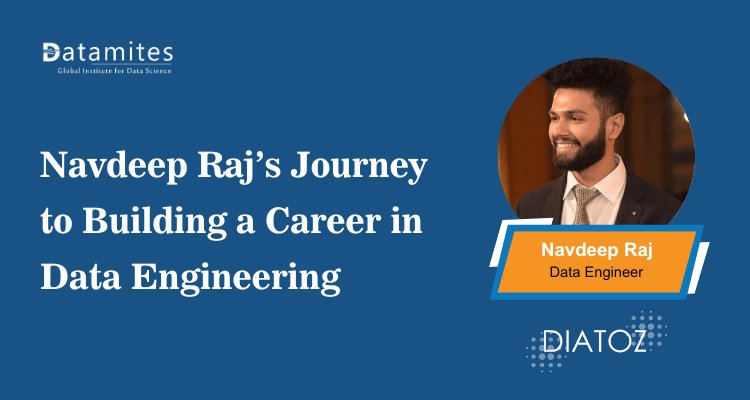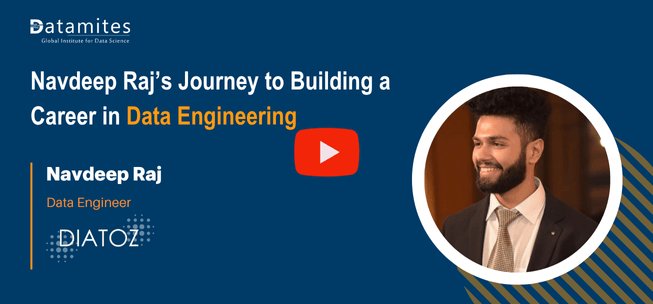Navdeep Raj’s Journey to Building a Career in Data Engineering
Discover how Navdeep Raj transformed his passion for data into a successful career in data engineering, mastering key tools and technologies along the way. His journey highlights the dedication, learning, and practical experience needed to excel in the evolving world of data.

Navdeep’s journey is a remarkable example of how dedication, structured learning, and practical exposure can open new career pathways. Coming from a mechanical engineering background, he decided to transition into the field of data science, driven by his growing interest in data and analytics. Enrolling in the Data Science program at DataMites equipped him with a strong foundation in Python, statistics, and machine learning through hands-on projects and expert mentorship. The step-by-step guidance and real-world applications helped him gain both confidence and technical clarity.
Supported by the placement assistance and practical training provided by DataMites, Navdeep successfully cleared his first interview with Diatoz Company, where he began his career as a Data Science Intern. The knowledge he gained through practical assignments and concept-based learning helped him perform exceptionally well during the interview. Navdeep’s transformation from a non-IT graduate to a data professional showcases how consistent effort, continuous learning, and structured mentorship can lead to career success. His inspiring journey stands as a true DataMites success story, reflecting the institute’s impact in shaping skilled and confident data science professionals.
Navdeep Raj’s Path to Becoming an Associate Data Engineer through DataMites
Navdeep Raj upskilled through DataMites’ structured training and practical learning approach. His commitment and hands-on experience helped him progress to the role of Associate Data Engineer.
Q1. How did you start your journey into data science?
I completed my B.Tech in Mechanical Engineering in 2019. Even during my studies, I developed a strong interest in data and its influence on decision-making. My transition to data science began with my training at DataMites, which laid the foundation for my understanding of data analysis, machine learning, and practical project work.
Q2. What inspired you to choose data science despite being from a non-IT background?
Data has always fascinated me. The way data drives real-world applications and solutions pushed me to explore this domain. Although shifting from mechanical engineering to data science felt overwhelming at first, curiosity and consistency helped me navigate the change.
Q3. What advice would you give to non-IT professionals aspiring to enter data science?
The key is dedication and patience. Start with the basics, focus on programming fundamentals, and gradually explore analytical tools. Avoid comparing your progress with others. Once your foundation is strong, advancing into complex topics becomes much easier.
Q4. How did you begin learning Python programming?
Python was my first programming language, and I learned it during my DataMites training. The program began with fundamentals rather than jumping into advanced concepts, which made learning smoother. Interactive live classes and Q&A sessions with mentors also helped me gain clarity.
Q5. Which platforms did you use to practice Python?
In the beginning, I used free online Python compilers to run simple programs. Later, I learned how to set up Python locally on my computer, which gave me more flexibility to experiment with projects and assignments.
Q6. How did you transition from data science to data engineering?
After completing my course, I began as a data science intern. During my first project, I got exposure to big data environments, where I worked on Apache Spark, Power BI, and data pipelines. That experience gradually led me into the data engineering domain, where I could blend analytics with large-scale data processing.
Q7. What tools and technologies do you currently use as a data engineer?
I currently work with Scala, Apache Spark, SQL, Apache Airflow, Oozie, and Jenkins for automation and CI/CD. These tools are essential for building, managing, and orchestrating data pipelines in enterprise environments.
Q8. Have you worked with real-time streaming data?
Yes, in one of my previous projects, I worked with Apache Kafka for handling real-time streaming data. It was integrated with Spark Streaming and Scala to manage both batch and live data efficiently.
Q9. How important is learning Apache Spark or PySpark for beginners?
It’s very important. Data Engineers are responsible for preparing data for analysis, and Spark plays a vital role in processing large-scale data efficiently. Beginners should start by mastering one programming language, learning SQL basics, and then exploring Spark or PySpark for transformation and analysis.
Q10. What if someone knows only Python, but companies require other languages?
Don’t get overwhelmed. Programming languages mainly differ in syntax, not logic. If you’re clear with your programming basics in Python, you can easily adapt to others like Java or Scala. Focus on understanding problem-solving rather than memorizing syntax.
Q11. How was your first interview experience?
My first interview experience with Diatoz Company was both exciting and memorable. The questions mainly covered basic machine learning and data science concepts. Thanks to the practical training and data science projects I completed at DataMites, I was well-prepared and confident throughout the process, which helped me secure the internship successfully.
Q12. What kind of questions are typically asked in data science interviews?
Most interviews include a mix of theoretical and practical questions. Recruiters usually begin with your resume’s mentioned skills, followed by hands-on coding tasks or real-world use cases. It’s important to explain your thought process while solving problems, not just the final output.
Q13. How do you manage time between work and continuous learning?
Time management is essential in tech. I dedicate at least 30 minutes to an hour daily to learning new tools or technologies. Instead of trying to learn everything at once, I focus on one topic at a time. Over time, this consistency helps add new skills without feeling overwhelmed.
Q14. How should freshers build their project portfolio?
Freshers should start by revisiting data science projects done during their training programs. Understand the end-to-end process of data collection, cleaning, modeling, and visualization. Online resources like Medium and Kaggle provide excellent use cases to explore. Document your projects well and ensure you can explain every step confidently in interviews.
Q15. What final message would you like to share with aspiring data professionals?
Be patient and consistent. Don’t rush to learn every tool or language. Begin with the basics of Python, SQL, and analytics, and slowly progress toward frameworks like Spark or Kafka. Having doubts is part of learning, ask questions, stay curious, and communicate confidently. Over time, this process will help you become both technically strong and industry-ready.
Refer to these articles:
- Exploring the Evolution of Data Engineering with Nikhil
- How Abhishek Landed a Career as an AI/ML Engineer ?
- Vinay journey from fresher to data analyst
Key Takeaways from Navdeep’s Data Science Journey with DataMites
Navdeep’s journey demonstrates how focused learning, practical exposure, and mentorship from DataMites enabled him to successfully transition from a non-IT background into a professional data science career.
- Navdeep hails from a mechanical engineering background and aspired to move into the analytics field.
- His curiosity about data and technology motivated him to pursue a career in data science.
- He enrolled in the Data Science training program at DataMites, which provided structured, hands-on learning.
- The course curriculum covered Python programming, statistics, and machine learning with real-time projects.
- Mentors at DataMites offered step-by-step guidance, helping him understand core technical concepts clearly.
- Navdeep’s project on Random Forest algorithms became a key highlight during his interview.
- DataMites’ focus on practical learning and applied projects built his confidence to face interviews.
- The training emphasized real-world implementation, bridging the gap between theory and practice.
- He learned to work on end-to-end data workflows using essential data science tools, improving his analytical and problem-solving skills.
- The mock interviews and placement assistance from DataMites helped him prepare effectively for job opportunities.
- Navdeep’s first interview was with Diatoz Company, where he was selected as a Data Science Intern.
- The interview primarily tested his understanding of basic machine learning concepts, which aligned well with his training.
- He credits DataMites for providing the confidence and knowledge foundation needed to perform well.
- In his current role, Navdeep applies his learning to handle data analysis and model implementation tasks.
- He believes that with proper training and consistent effort, non-IT students can successfully build careers in data science.
Refer to these articles:
- How to Become a Data Scientist in Bangalore?
- Data Science Course Fee in Bangalore
- How to Become a Data Scientist in Chennai?
- Data Science Course Fee in Chennai
Navdeep Raj’s data engineering career highlights how a strong commitment to learning and practical exposure can lead to a successful transition into the tech industry. Coming from a mechanical engineering background, he proved that with consistent effort, the right guidance, and real-world training, it’s possible to build a thriving career in data-focused roles. By mastering key concepts in Python, SQL, and data handling through hands-on projects, Navdeep demonstrated how structured learning can transform potential into professional success. His journey shows that with the right direction, anyone can
Inspired by Navdeep’s journey, now is the perfect moment to pursue a career in Data Engineering, one of the most dynamic and fast-growing fields in technology. As organizations continue to depend heavily on data-driven processes, the demand for skilled data professionals is rapidly expanding. According to The Business Research Company, the Data Science Platform market was valued at $120.49 billion in 2024 and is projected to grow at a CAGR of 32.7%, reaching $476.36 billion by 2029. This surge is fueled by the rising importance of big data analytics, with North America leading the way and the Asia-Pacific region showing the fastest growth. Enrolling in a top-tier city's data science course in Bangalore, Hyderabad, Kolkata, Pune, Mumbai, Chennai, or Delhi can empower learners with the technical expertise and practical exposure needed to succeed in this ever-evolving landscape.
A mechanical engineering graduate by qualification, Navdeep decided to pivot his career into data science and enrolled in a comprehensive program at DataMites. The structured course provided him with practical exposure to Python, SQL, machine learning, and data workflows through project-based learning. Regular online sessions, mentor-led training, and internship opportunities strengthened his technical foundation and boosted his confidence. Supported by globally recognized data science certifications such as IABAC and NASSCOM FutureSkills, Navdeep built both the knowledge and credibility required to enter the industry.
Today, Navdeep is advancing in his career as an Associate Data Engineer, applying his learning to design, manage, and optimize data solutions. His journey stands as proof that with dedication, consistent practice, and structured mentorship, it is possible to transition successfully into data science and engineering roles. Programs like DataMites continue to empower learners across India with the skills and certifications needed to succeed in the data-driven era.
For learners in Karnataka, enrolling in a Data Engineer Course in Bangalore offers comprehensive practical training, hands-on project exposure, and expert mentorship to prepare for a successful career in data engineering.
For learners in Tamil Nadu, enrolling in a Data Engineer Course in Chennai provides in-depth technical training, real-world project experience, and expert mentorship to build a strong foundation for a successful career in data engineering.

